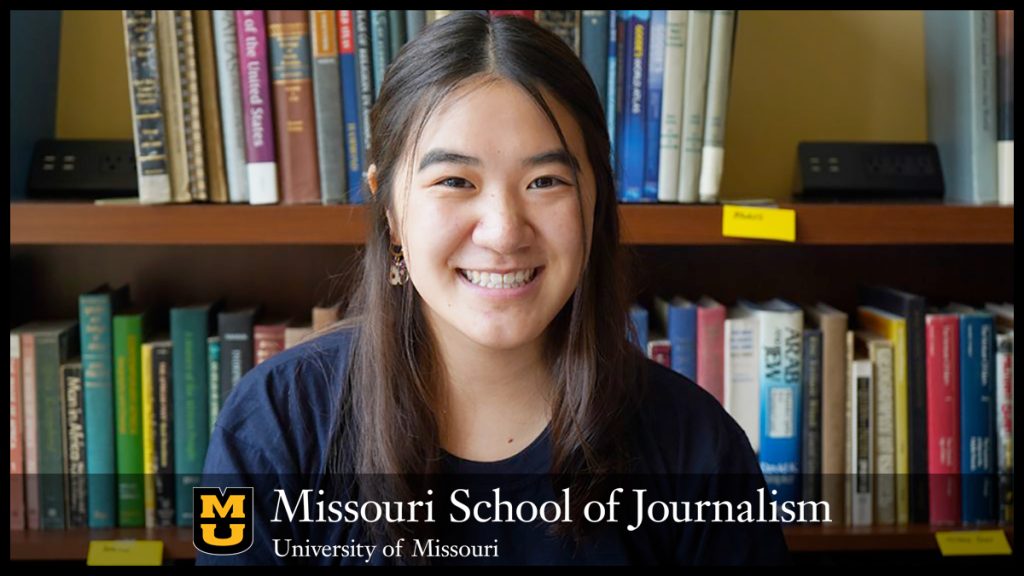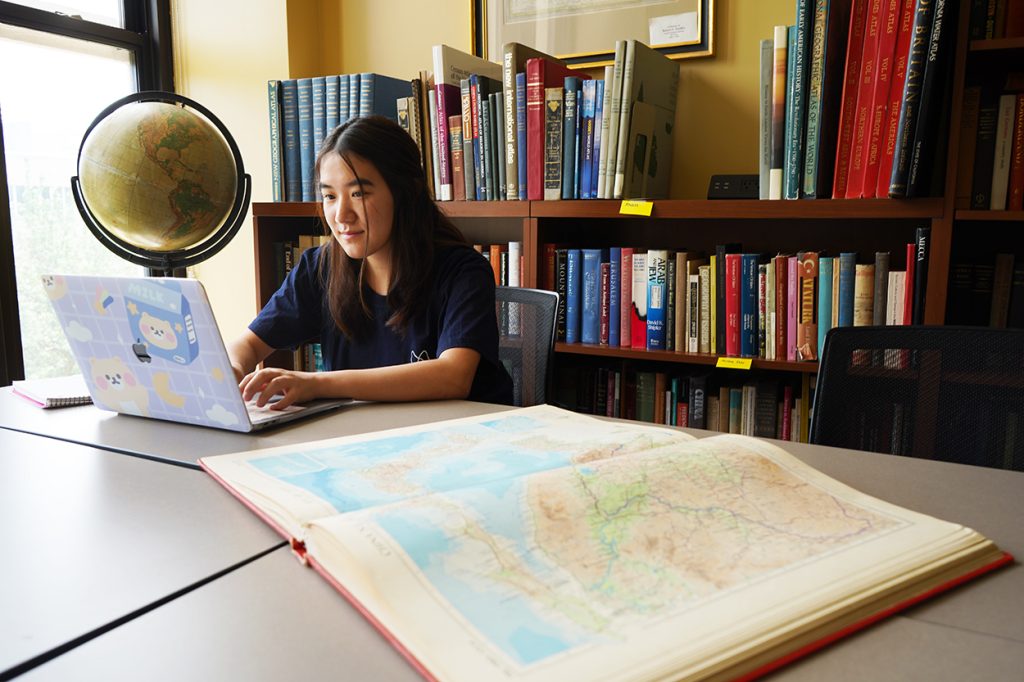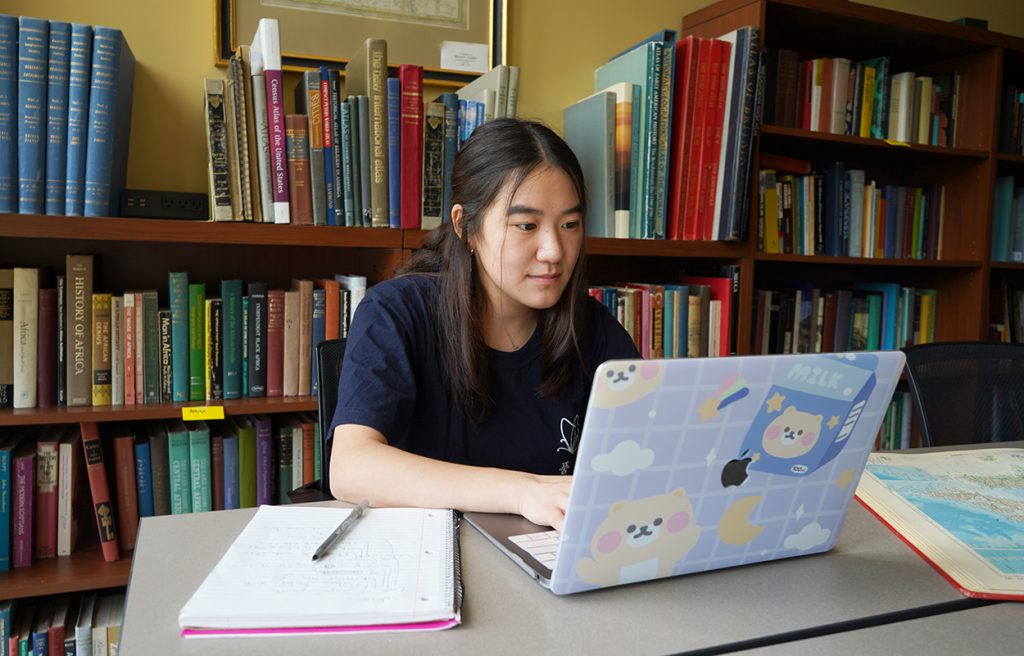Turning curiosity into research

Faith Quist’s research project is a perfect reflection of her interdisciplinary interests. A dual major in journalism and international studies at the University of Missouri, Quist is studying a variety of materials related to North Korean defectors. Her primary focus is researching when individuals leave the country, where they go and why they choose those locations.
“This project allows me to combine my passions,” said Quist, who will be a senior this fall. “I’ve always been a very curious person, and I like to ask questions. I love hearing about other people’s stories. I have an interest for international work as well.”
Quist, who is also minoring in geography and Chinese studies, was first intrigued by Korea-related issues after taking both Korean history and world political geography classes last fall. Her first research interest was on South Korean foreign policy and has now expanded to issues of human migration and sense of place. Quist’s research mentor is Doug Hurt, an assistant teaching professor of geography, who studies geographic patterns resulting from attachment to place, among other topics.
“I was interested in the Korean peninsula because of its use historically as a means for other countries to invade each other,” Quist said. “As I continued to read and learn more, I realized that my project needed to evolve a bit, and I decided to focus more on individuals who leave North Korea and the reasons they choose where to go. Dr. Hurt is big on studying sense of place, so I started to explore that concept.”
Quist will be able to devote more resources into her project this summer after being named a Cherng Summer Scholar. A full-time, nine-week summer research or creative scholarship program for Honors College students, the program is supported by a gift from Peggy and Andrew Cherng and the Panda Charitable Foundation. Recipients receive a $7,000 award and access to a $1,000 project expense account.

“I’m always on the lookout for scholarship opportunities,” Quist said. “What I love about this program is that you get to create your own project. You aren’t picking from a list of topics and doing something that you may not have much of an interest in. Each of us have the freedom to explore our passions and make the projects our own.
“I also love the cohort aspect. I really enjoy meeting with the other scholars and learning about what they are researching. We’re all doing such unique work.”
Quist’s research consists of her reading scholarly articles, combing through news reports and watching documentaries, looking for anything tied to North Korean defectors. She is searching for patterns and synthesizing the overwhelming amount of information. Quist said the work can be a bit difficult at times due to her inability to interact with individuals on a personal level.
“I’m obviously not in these places and I can’t interview people in-person,” Quist said. “A lot of the information can be tough to verify. My goal is really just to gain a better understanding of what is going on.”
Quist said there are four primary phases when North Koreans have left the country over the years. She is looking at those as well as three different places they settle in – China, South Korea and the United Kingdom. Quist is letting the question of sense of place guide her research.
“The reason North Koreans make the difficult decision to leave is very complex,” Quist said. “Each new location brings positives and negatives. China is bordered with North Korea, so there are benefits to going there. Being that close to where North Koreans are originally from does help facilitate that sense of peace, but they risk being sent back by the Chinese police. South Korea seems like it would be a natural fit, but there are some difficulties there with integrating into its fast-paced and high-tech society. In the UK, North Koreans often find it easier to build a community with their South Korean peers, but it’s much farther from their home.”

While Quist’s general curiosity and investigative nature made research a natural fit, her upbringing has played a role in the area she is studying. Quist was born in China and moved to the United States when she was 14 months old after being adopted. She grew up in Minnesota, where she attended a Chinese immersion school, meaning she learned both English and Mandarin Chinese throughout her youth. Her interest in study abroad opportunities, and having a sister already at MU, is what brought her to Columbia.
“Study abroad was extremely important to me as I was making my college decision,” Quist said. “I was looking at programs where I could go for an extended period of time, too. MU has so many great options and several great funding opportunities.”
Quist just returned from a semester-long exchange experience in Singapore. Offered through the Mizzou School of Journalism, Quist spent her time at Nanyang Technological University studying journalism.
“I wanted to be in Asia, so this was a perfect opportunity,” Quist said. “It was an amazing experience I won’t ever forget.”
Quist has her sights set on international work as she heads into her final year at MU. She is working through a couple fellowship opportunities currently and said she would eventually like to move to east or southeast Asia. Quist has several items on her bucket list, such as teaching language skills to students abroad, working with a nonprofit overseas and going down the diplomacy path.
Quist is also adding to her language knowledge with a focus on becoming a polyglot, someone who is fluent in five or more languages. She is using part of her Cherng Summer Scholar funding to take Korean lessons, which helps her research readings, and is also learning Vietnamese. Quist has plans to learn Japanese as well.
“I want my work to have an international focus,” Quist said. “I love connecting with people and have an interest in building peace stability across countries. I want to help facilitate cross cultural exchanges and understanding.”
Updated: July 14, 2023